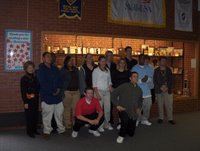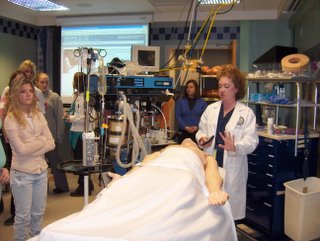 Found this pic in a BBC photo caption contest. The caption - "26 December, Job Centre"
Found this pic in a BBC photo caption contest. The caption - "26 December, Job Centre"
Friday, December 23, 2005
Monday, November 28, 2005
Workforce Development & Healthcare
 On November 14th, the Institute of Politics convened a group to discuss the workforce development challenges facing the healthcare industry. The speakers made many interesting points. Many speakers emphasized the fact that workforce availability and quality impacts quality of care. There were also numerous remarks about the the skill shortages that exist across a broad range of occupations. (Workfore shortages go far beyond just nursing.) Many speakers also commented on the need for early and continuous career education. Finally, the need for collaboration across divergent groups is essential. No singular institution is going to fix the problem.
Of course, being a researcher -- I walked away from the event with more questions. Any answers out there?
On November 14th, the Institute of Politics convened a group to discuss the workforce development challenges facing the healthcare industry. The speakers made many interesting points. Many speakers emphasized the fact that workforce availability and quality impacts quality of care. There were also numerous remarks about the the skill shortages that exist across a broad range of occupations. (Workfore shortages go far beyond just nursing.) Many speakers also commented on the need for early and continuous career education. Finally, the need for collaboration across divergent groups is essential. No singular institution is going to fix the problem.
Of course, being a researcher -- I walked away from the event with more questions. Any answers out there?
- Nancy Zionts’ remarks emphasized the connection between workforce development and quality of care. If quality of care is the ultimate goal – which workforce development strategies are the most effective?
- Most of the panelists focused on building the pipeline of future workers. However, the PA Workforce Investment Board and numerous national groups have identified constraints in the educational pipeline such as a lack of faculty and clinical sites. How can the region overcome these pipeline problems?
- Jill Clements remarks briefly mentioned the impact of regulation on the healthcare industry. Credentialing, regulation and reimbursement policies have a major impact on the sector and the workforce. What do legislators need to know about how these regulations impact workforce quality and availability?
- Kathy Malloy and Jay Cannon mentioned the challenges of keeping pace with the rapidly changing educational requirements of the healthcare industry. One innovation that is reshaping the industry is the movement towards electronic health records. How does this innovation increase skill requirements for the workforce? Are our educational institutions prepared to meet this challenge?
- Steve Herzenberg discussed the need for a collaborative approach to workforce development. Are the region’s healthcare providers working collaboratively towards addressing workforce challenges or is it still a “go-it-alone” strategy?
Wednesday, November 23, 2005
Manufacturers Bemoan "Dearth of Career Counseling"
Macy's Parade Workforce Development
Tuesday, November 22, 2005
Butler Students Learn About Healthcare Careers & WISER
Monday, November 21, 2005
Retention Initiatives on the Rise
Friday, November 18, 2005
Live from DC -- People Do Matter!
 Live from Washington DC... It's the Pinnacle Awards! I'm here in Washington DC with fellow Pittsburgh Human Resource Association Board members (Faith Stipanovich, John Oliverio, and Kelly Scott) to accept the pretigious Pinnacle Award for outstanding chapter achievement. The PHRA is being recognized for the organization's role as a founding partern of the People Do Matter Initiative -- a program aimed at recognizing outstanding HR practices in the Pittsburgh region. This is great news for all of the PDM partners and the Pittsburgh region.
The size, scope and quality of this conference is impressive -- more than 900 chapter leaders from across the country are in attendance. Last night we toured the rather impressive home office for SHRM (home to 300 employees and a whopping 87 million budget). More photos later from the main stage. Better go sign autographs ;-)
Live from Washington DC... It's the Pinnacle Awards! I'm here in Washington DC with fellow Pittsburgh Human Resource Association Board members (Faith Stipanovich, John Oliverio, and Kelly Scott) to accept the pretigious Pinnacle Award for outstanding chapter achievement. The PHRA is being recognized for the organization's role as a founding partern of the People Do Matter Initiative -- a program aimed at recognizing outstanding HR practices in the Pittsburgh region. This is great news for all of the PDM partners and the Pittsburgh region.
The size, scope and quality of this conference is impressive -- more than 900 chapter leaders from across the country are in attendance. Last night we toured the rather impressive home office for SHRM (home to 300 employees and a whopping 87 million budget). More photos later from the main stage. Better go sign autographs ;-)
Tuesday, November 15, 2005
Road Trip Nation Inspiration
 A lot of us career development geeks are big fans of Road Trip Nation -- a tv show about two college students who went on a roadtrip to learn how successful business leaders found their career path. Personally, I love the show because it's so much more human and realistic than the average career guide. It celebrates the very imperfect journey we all take. Learn more from the WSJ... Or visit RTN online.
A lot of us career development geeks are big fans of Road Trip Nation -- a tv show about two college students who went on a roadtrip to learn how successful business leaders found their career path. Personally, I love the show because it's so much more human and realistic than the average career guide. It celebrates the very imperfect journey we all take. Learn more from the WSJ... Or visit RTN online.
Will PA Really Pass Career Ed Standards?
There's No Place Like Home
Proficiency Concerns
A report compiled by the Pennsylvania Economy League titled "Jobs of the Future" shows that highly skilled workers must be proficient in reading and math to compete for future jobs. The study points out the following concerns: 1. ) There will be jobs for people with only a high school degree, but more than one-half of the region's 11th graders are not proficient in math, and more than one-third of them are not proficient in reading. 2. ) More than 80 percent of the job openings will require only a high school diploma or a two-year degree. 3.) The Center for Workforce Information and Analysis estimates that, on average, nearly 85 percent of the future openings in the region will be replacement jobs, i.e. openings due to retirements, promotions, etc.
Read more online at www.alleghenyconference.org.Monday, October 31, 2005
Health Careers Awareness Week
Long Time, No Blog




 The student leaders pictured here are taking our career literacy materials, repackaging them for younger peers and helping other kids begin their own career exploration adventure. In October alone, we trained more than 50 of these Student Ambassadors. They're enthusiastic, creative and energizing. It's been an awesome fall here at HCPI!
The student leaders pictured here are taking our career literacy materials, repackaging them for younger peers and helping other kids begin their own career exploration adventure. In October alone, we trained more than 50 of these Student Ambassadors. They're enthusiastic, creative and energizing. It's been an awesome fall here at HCPI!
Monday, September 26, 2005
Apprenticeships -- The Real Reality Show
Career Exploration Resources
Monday, September 19, 2005
Busy Season
Friday, September 02, 2005
Katrina's Lesson in Globalization
Thursday, August 11, 2005
Wilkinsburg Kiwannis Share Passion for Investing in Our Region's Workforce
 Thanks to the Wilkinsburg Kiwannis for giving HCPI the opportunity to share the "Talent Trapeze" presentation this afternoon. The audience asked wonderful questions and had some exciting ideas for follow up activities. We're particularly excited about the support of the Wilkinsburg school administrators who were in attendance. It's through these generous ideas and support that HCPI is able to improve workforce development in Southwest PA. We look forward to the start of a new school year and many more presentations about career-exploration opportunities in our region.
Thanks to the Wilkinsburg Kiwannis for giving HCPI the opportunity to share the "Talent Trapeze" presentation this afternoon. The audience asked wonderful questions and had some exciting ideas for follow up activities. We're particularly excited about the support of the Wilkinsburg school administrators who were in attendance. It's through these generous ideas and support that HCPI is able to improve workforce development in Southwest PA. We look forward to the start of a new school year and many more presentations about career-exploration opportunities in our region.
In the UK, Healthcare Jobs are Dreamy
TOP 10 DREAM JOBS FOR KIDS TOP 10 DREAM JOBS FOR ADULTS 1) Doctor/Nurse 1) Writer 2) Vet 2) Teacher 3) Footballer 3) Landscape Gardener 4) Teacher 4) Paramedic 5) Actor/Movie Star 5) Photographer 6) Writer 6) Police Officer 7) Dancer/Ballerina 7) Physiotherapist 8) Pilot 8) Movie Director 9) Pop Star 9) Restaurant Owner 10) Astronaut 10) MusicianLearn more . . .
Saturday, July 30, 2005
High Flying Workforce
 Despite record fuel prices, one formerly struggling airline has finally turned a profit -- American Airlines is finally in the black. How? Remember those funny stories about getting rid of pillows on certain flights and eliminating olives from the salads?
American turned minor cost reductions into major savings. But the real story is that the ideas were products of the company's human capital -- the existing workforce. Christian Science Monitor reports that two American Airlines mechanics built "Thumping Ralph" --a drill-bit sharpener made from discarded household machinery that allows them to get more use out of each bit-- saving the airline as much as $300,000 a year. The airline also benefited from a group of pilots who figured out that they could save fuel costs by using only one engine to taxi.
What might happen if more managers listened to the ideas of their workforce? Read more...
Despite record fuel prices, one formerly struggling airline has finally turned a profit -- American Airlines is finally in the black. How? Remember those funny stories about getting rid of pillows on certain flights and eliminating olives from the salads?
American turned minor cost reductions into major savings. But the real story is that the ideas were products of the company's human capital -- the existing workforce. Christian Science Monitor reports that two American Airlines mechanics built "Thumping Ralph" --a drill-bit sharpener made from discarded household machinery that allows them to get more use out of each bit-- saving the airline as much as $300,000 a year. The airline also benefited from a group of pilots who figured out that they could save fuel costs by using only one engine to taxi.
What might happen if more managers listened to the ideas of their workforce? Read more...
Wednesday, July 27, 2005
HR Hatred
 The latest issue of Fast Company really caught my attention -- "Why We Hate HR." Obviously, a provocative title. I really like the picture, too. But reach beyond the visual and read the article -- it's worth it. Here's a snip: "HR is the corporate function with the greatest potential -- the key driver, in theory, of business performance -- and also the one that most consistently underdelivers. And I am here to find out why." Read more...
The latest issue of Fast Company really caught my attention -- "Why We Hate HR." Obviously, a provocative title. I really like the picture, too. But reach beyond the visual and read the article -- it's worth it. Here's a snip: "HR is the corporate function with the greatest potential -- the key driver, in theory, of business performance -- and also the one that most consistently underdelivers. And I am here to find out why." Read more...
Monday, July 25, 2005
In the Pink
Sunday, July 10, 2005
Wissensfabrik
 Germany has long been a model for business-education partnerships. Their model for vocational education has been the envy of many leaders in the states. This article reveals they have their own challenges and some exciting solutions. Take a look at how Germany is building an educational "knowledge factory."
http://www.iht.com/articles/2005/07/08/business/wbnurture.php#
Germany has long been a model for business-education partnerships. Their model for vocational education has been the envy of many leaders in the states. This article reveals they have their own challenges and some exciting solutions. Take a look at how Germany is building an educational "knowledge factory."
http://www.iht.com/articles/2005/07/08/business/wbnurture.php#
Sunday, July 03, 2005
Southwest Pennsylvania Business Education Foundation
 On June 21st, Board members of the Southwest Pennsylvania Business Education Foundation completed training to be speakers for the Human Capital Policy Initiative. The training was held at the beautiful new campus of South Fayette High School. Special thanks go to Terry Brennan for coordinating the training. These extraordinary educational leaders shared exciting ideas about how they plan to ensure that children are given the tools they need to explore careers and acheive their goals.
On June 21st, Board members of the Southwest Pennsylvania Business Education Foundation completed training to be speakers for the Human Capital Policy Initiative. The training was held at the beautiful new campus of South Fayette High School. Special thanks go to Terry Brennan for coordinating the training. These extraordinary educational leaders shared exciting ideas about how they plan to ensure that children are given the tools they need to explore careers and acheive their goals.
HCPI Inspiration in San Diego
 Nearly two dozen HR leaders from Pittsburgh attended the Society for Human Resource Management Conference in San Diego, California in June, 2005. It was an outstanding opportunity to listen to remarkable speakers, participate in high quality workshops, meet other HR professionals (approximately 25,000 of them!) all and experience a little California sunshine.
HCPI colleagues would have loved Malcolm Gladwell's keynote address. (Gladwell's book, "The Tipping Point," was nearly the bible for HCPI's creation!)
Gladwell told a compelling story to illustrate why we need processes and systems to protect us from our sometimes inaccurate instincts. His example -- the gender bias of international symphonies before the introduction of a screen to obscure the gender of performers. Before the screen there were hardly any female musicians playing in world-class symphonies. After the screen, guess who started playing with the boys?
Another SHRM attendee wrote a good article about Gladwell's findings. Read more...
Nearly two dozen HR leaders from Pittsburgh attended the Society for Human Resource Management Conference in San Diego, California in June, 2005. It was an outstanding opportunity to listen to remarkable speakers, participate in high quality workshops, meet other HR professionals (approximately 25,000 of them!) all and experience a little California sunshine.
HCPI colleagues would have loved Malcolm Gladwell's keynote address. (Gladwell's book, "The Tipping Point," was nearly the bible for HCPI's creation!)
Gladwell told a compelling story to illustrate why we need processes and systems to protect us from our sometimes inaccurate instincts. His example -- the gender bias of international symphonies before the introduction of a screen to obscure the gender of performers. Before the screen there were hardly any female musicians playing in world-class symphonies. After the screen, guess who started playing with the boys?
Another SHRM attendee wrote a good article about Gladwell's findings. Read more...
Saturday, July 02, 2005
Will Controlling Health Care Costs Hurt the Economy?
 At last week's Society for Human Resource Management's annual conference, I was struck by how often people mentioned their concerns about rising healthcare costs. This is a business challenge that the HR community is struggling to address. On the positive side, if they can find a way to control costs, they'll gain the attention of their organizations' leaders. On the negative side, controlling costs may mean a shift of the burden from the employer to the individual.
At last week's Society for Human Resource Management's annual conference, I was struck by how often people mentioned their concerns about rising healthcare costs. This is a business challenge that the HR community is struggling to address. On the positive side, if they can find a way to control costs, they'll gain the attention of their organizations' leaders. On the negative side, controlling costs may mean a shift of the burden from the employer to the individual.
What I began to wonder is what will controlling healthcare costs mean to our region's economic development? The healthcare sector is a large and powerful component of our regional economy. How can we control business costs without hindering the health of the industry itself? Will we be able to control costs without hindering job growth, wages, technological advances, etc.?
Some of the issues are laid out nicely in a US Health and Human Services Report available at: http://aspe.hhs.gov/health/costgrowth/.
What do you think?

